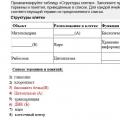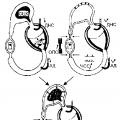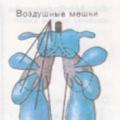This is just a “holiday” for both applicants and Unified State Exam tutors in biology
Since 2016 on the official website of the Federal Institute of Pedagogical Measurements (FIPI) published Open Unified State Exam task bank. It groups tasks into 7 Blocks of the Codifier everyone Unified State Exam tests in biology for all previous years of passing the Unified State Exam in our country, and there are already 4968 of them.
189 Year Questions and 259 Year Questions have been added.
Although the form of test tasks itself is in 2017, in essence nothing has changed :
It is virtually impossible to come up with completely new tasks (the school subject biology is not rubber) and Almost all the questions in the new test tasks are reworked old tasks.
Now you don’t need to “rummage” through the Internet in search of all kinds of “replacement” tests, because you can come across one.
The FIPI open task bank is a powerful basis for testing your knowledge. True, answers to test tasks are not given, but this will certainly push you to study relevant topics in biology manuals. And to test your knowledge, I can advise you to buy from me the answers to all the questions of the Obz (4969 answers).
Answering the questions of the Observatory on your own, published on FIPI website or by reading them on my blog in the ““ Category, you then compare your answers with my answers.
If you decide to buyquestions with answersin .pdf format at any from 7 Blocks of Obz FIPI or buy all sections at once,
Write me a letter [email protected] about the desire to make a purchase.
After my answer, you will know what I haveYour e-mail address, to which I will arrive on the same day (sometimes immediately) after your paymentI will send the purchased materials.
1.
Biology as a science. Methods of scientific knowledge. Total 76
tasks - 50 rubles.
2.
Cell as a biological system. Total 736
tasks - 400 rubles.
3.
An organism as a biological system. Total 991
task - 500 rubles.
4.
System and diversity of the organic world. Total 717
tasks - 350 rubles.
5
. The human body and its health. Total 711
tasks - 400 rubles.
6.
Evolution of living nature. Total 728
tasks - 400 rubles.
7
. Ecosystems and their inherent patterns. Total 530
tasks - 350 rubles. 8
. Answers to KIM Unified State Exam questions, added to the FIPI OBZ to all Blocks after exams held in 2017.Total 189
tasks - 250 rubles9.
Answers to KIM Unified State Exam questions,
added to the FIPI OBZ to all Blocks after exams passed in 2018. Total 259
tasks - 350 rubles.
All 5010 questions with answers across all 7 blocks at once The open bank of FIPI tasks (including tasks for 2017 and 2018) can be purchased for 3050 rubles, and with a 25% discount, that is, for 2250 rubles.
To get to the page with the payment methods I offer,
____________________________________________________________
Examples of my responses are presented below:
All genetics assignments solved with full explanation. As you can see, my answers are not written out on a separate sheet in the form of a simple set of numbers, completely inconvenient for comparison with questions, but are placed directly in the “body” of the exam task itself (my answers are text, highlighted in red)

FREQUENTLY ASKED QUESTIONS size="+2">
Most of the problems will be solved if you disable ad blockers that interfere with the functionality of site scripts. Just in case, check if the problem persists if you use a different browser. If not, read the list of frequently asked questions. If this does not help, ask your question at the bottom of the page.
General questions size="+1">
Answer: Ask yours in the group on VKontakte.
Answer: Write in the “Report an error” form, every task has one.
Answer: Uncheck your browser to autofill fields.
Answer: Do not log in for a year, it will be deleted automatically.
Answer: Not provided.
Answer: The Unified State Exam scale is listed in the “About the Exam” tab.
Answer: The tasks in the main catalog correspond to the specifications and demo versions of the current year's exams. Many questions are taken from previous years' examination materials. Their list can be seen on the “Options” page.
Student size="+1">
General questions size="+1">
Answer: In the “My Statistics” section, logging in with your username.
Answer: Complete testing. The system itself will provide solutions.
Answer: For assignments worth multiple points, a portion of the points will be awarded.
Answer: The options compiled by the teacher in the “For Teacher” section will appear in his lists automatically after you solve the option and click the “Save” button.
Answer: It won't go.
Answer: Continue the solution from the “My Statistics” section.
size="+1">
Answer: You are logged in under a different login.
Answer: There is an error in the number or you are opening from the page of another item.
For the teacher size="+1">
Something doesn't work or doesn't work correctly size="+1">
Answer: Most likely, log in under a different login.
Answer: Students must first register on the portal. You do not have to add them to the lists; they will appear on the lists automatically after they complete any work assigned to them, created by the teacher in the “For Teachers” section.
Answer: Check whether you are in the right section (example: for a magazine on basic mathematics, see basic mathematics).
How to delete, restore, rename? size="+1">
Answer: Move it to the archive.
Answer: Find the student on the student list page and delete from there. It will disappear from the log automatically.
Answer: Open the list of archived ones and click the restore button.
Answer: Restore works and students from the archive.
Answer: Click on the student's name and rename it.
Preparation of options (works for students) size="+1">
Answer: Use the instructions in the “For Teacher” section.
Answer: In the “test parameters”.
Answer: Click on the button to select a topic, then on the work icon to attach it to the topic.
Created works, working on bugs size="+1">
Answer: In the “Teacher” section you can create your own tasks; the answers to them cannot be found anywhere. At the same time, while doing work at home, students can ask a relative, tutor or classmate for advice.
Answer: At any time in the test parameters.
Answer: For the work created in the “Teacher” section, you can view the solutions by clicking on the work and the student’s name.
Answer: In the class journal, click on the work number, a summary table will appear for each student and each assignment, and the average score for each assignment will be calculated.
(my messages are highlighted in red, FIPI’s replies are in blue)
Good afternoon
According to my observations, the bank of Unified State Exam tasks in social studies has not changed since 2015, while many tasks have undergone significant changes.
On the basis of what materials will the Unified State Exam tests be compiled in 2017?
Thank you!
Dear Stanislav, hello!
1) The Unified State Exam task bank is updated annually with current tasks for the current year.
2) Options for the Unified State Exam in social studies are collected not only from Open Bank tasks;
3) about methodological approaches to using the Open Bank, you can
find out, for example, here http://fipi.ru/sites/default/files/document/1472212458/obshchestvoznanie.pdf p.26-27
Best regards, T.E. Liskova
Good afternoon
Thanks for the answer!
You write “2) Options for the Unified State Exam in social studies are collected not only from Open Bank tasks.” My question was, on the basis of what materials do you compose exam versions of the Unified State Examination. The file you attached contains only recommendations and does not contain specific instructions on sources.
Thank you!
Dear Stanislav!
Your observations do not correspond to reality - the open bank of Unified State Exam assignments in social studies, as in all other academic subjects, is annually replenished with assignments from the passed exam. The open bank of Unified State Examination tasks includes a large number of tasks from real exams from previous years and can be used not only for pre-exam repetition, but also in the process of studying the subject for current and midterm control.
KIM Unified State Exam 2017 in social studies (as well as in all other academic subjects) are compiled on the basis of the specification of KIM Unified State Exam 2017 published on our website and will correspond in structure and level of complexity to the demo version of KIM.
Sincerely, Olga Alekseevna Kotova,
Good afternoon Thanks for the answer!
I would like to note the following:
« Brief list of normative legal acts" specified in the specifications implies expanded list, but where to get it is not indicated.
Dear Stanislav,
a detailed list can be compiled by a social studies or law teacher. The short list contains only the minimum necessary legal acts, their sections, chapters, and articles.
Deputy Director of the Federal State Budgetary Institution "FIPI"
Dear Olga Alekseevna, my question is the following: are any elements included in the exam tests other than:
— information contained in textbooks from the federal list of textbooks
— a short list of regulatory legal acts from the specifications
— a bank of Unified State Examination tasks presented on the official website of FIPI?
Earlier you wrote: “a detailed list (NPA) can be compiled by a social studies or law teacher. The short list contains only the minimum necessary legal acts, their sections, chapters, and articles.” Do I understand you correctly that legal acts that are not included in the short list can be used in exam tests? If this is the case, then students may not have equal opportunities to obtain the maximum score, since the “detailed” list of legal requirements may differ significantly from teacher to teacher.
Thank you for your reply!
Stanislav,
You cited some inconsistent sources. The content of the examination work is determined by the Federal component of the state educational standard, which provides a list of didactic units that are subject to study and control (this list of diagnostic units is reflected in the Codifier for compiling the Unified State Exam KIM). In theory, all textbooks included in the Federal List of the Russian Ministry of Education and Science should, to one degree or another, disclose this content.
The short list of legal acts provided in the Specification of the KIM Unified State Exam guides teachers and students in which legal acts and in what part should be used when studying specific legal issues of the course (from among those provided for by the State Educational Standards Code and presented in our codifier). This is important because textbooks do not always contain up-to-date legal material and definitely do not keep up with changes in legislation. This does not involve memorizing any norms. It is important to navigate them and understand them as a whole.
The open task bank contains real exam tasks from previous years. Several questions in the examination paper are taken from this bank, and the rest are taken from the closed part of the bank. So there are tasks in the options that are not presented in the open bank. But they all correspond to the parameters specified in the work plan in the CMM Specification.
Sincerely, Olga Alekseevna Kotova,
Deputy Director of the Federal State Budgetary Institution "FIPI"
Olga Alekseevna, good evening!
The Federal State Educational Standard and the Federal State Educational Standards component in social studies do not disclose the scope and specific content of each element being tested, just as the codifier of topics in the Unified State Exam KIM does not provide information about the extent to which the student should know them. In this regard, I have a question: what specific materials does FIPI use when compiling exam options? And what is the justification for the existence of a closed task bank? Considering that neither the KIM nor the Federal State Educational Standards disclose the scope and content of topics, the exam may present a task that will be impossible to answer using FPU textbooks, which violates Article 43, paragraph 2 of the Constitution of the Russian Federation.
I would also like to note that Appendix No. 2 of the specifications (a short list of legal acts) is not marked as advisory when preparing for the exam or as mandatory and, accordingly, it is not possible to understand its purpose without additional contact with FIPI.
Stanislav,
You can address questions of regulatory regulation of the content of education to the Ministry of Education and Science of Russia.
FGBNU "FIPI" does not have the authority to mark any materials as mandatory for preparation for the Unified State Exam.
The purpose of a short list of legal acts is explained by our specialists, incl. in video consultations for those taking the Unified State Exam.
The task bank can be used by the teacher in the educational process for current and thematic control, as well as by the teacher and students to organize pre-exam repetition.
Sincerely, Olga Alekseevna Kotova,
Deputy Director of the Federal State Budgetary Institution "FIPI"
Olga Alekseevna, good morning.
You answer this: “The Federal State Budgetary Institution “FIPI” does not have the authority to mark any materials as mandatory for preparing for the Unified State Exam.” without answering the question asked.
Since you do not give me a direct answer to the question, I repeat: what materials do specialists use when writing exam tests? I have the right to receive an answer to this question, since it is your responsibility to create conditions for equal receipt of information. Without such information, you are preventing the implementation of Art. 43 clause 2 of the Constitution of the Russian Federation and art. 5 clauses 3 and 4 of the Law on Education of the Russian Federation.
Thank you for your reply!
I write: “What specific materials does FIPI use when compiling exam options?”
Federal component of state educational standards, FPU textbooks
Further, I am not asking a question about “regulatory regulation of the content of education”, I am asserting that “the Federal State Educational Standard and the Federal State Educational Standards component in social studies do not disclose the volume and specific content of each element being tested,” I would be grateful if you could provide me with evidence that in In the KIM Unified State Examination in social studies compiled by you, the volume and content of the topics are revealed.
________________________________
This issue does not fall within the competence of the Federal State Budgetary Institution "FIPI".
If “The purpose of a short list of legal acts is explained by our specialists, incl. in video consultations for those taking the Unified State Exam.” As a representative of a government agency, you are obligated to tell me where exactly I can get information about this.
________________________________
in CMM Specifications, appendix 2, commentary on the appendix title.
______________________
Sincerely, O.A. Kotova,
Deputy Director of the Federal State Budgetary Institution "FIPI"
There are myths circulating online and among schoolchildren that Unified State Exam assignments are written by certain people who can be found and asked for answers to the assignments. It is not true.
Since its introduction in 2001, the Unified State Exam of the Russian Federation has caused rejection and a lot of controversy. Nevertheless, the exam has been held for 17 years. At the same time, entire government structures have appeared that have been working all year to create the USE KIM. CMMs are control measuring materials. The most important thing in creating the Unified State Exam KIM is the assignments on the subject.
KIM Unified State Examinations are created at FIPI. FIPI is the Federal Institute of Pedagogical Measurements. At this institute, two teams work for each subject.
The first team is the team of compilers. FKR is the Federal Development Commission. This group of people compiles KIMs, as well as all accompanying methodological documentation. The composition of the FKR is very large; it includes specialists and methodologists from leading educational institutions of the Russian Federation.
FKR carries out activities on:
- CMM development;
- hotline counseling during the exam period;
- preparation of a summary analytical report on the results of the Unified State Examination;
- developing a methodology for checking tasks with detailed answers;
- checking USE work outside the Russian Federation;
- advising subject and conflict commissions;
- replenishment of the bank of open Unified State Exam tasks.
The second team is a team of experts. NMS - scientific and methodological council. This is a group of people who examines the completed assignments and approves them. The NMS consists of 11-20 members from among leading experts in the subject profile.
NMS carries out:
- discussion and consultation on the general methodology for compiling the Unified State Exam KIM and conducting the examination campaign;
- examination of methodological documentation and CMMs;
- preparation and discussion in the professional community of possible changes and innovations in the Unified State Exam methodology.
Let's talk about the creation of the USE KIM in more detail.
Of course, it is very difficult to describe the entire procedure for creating a CMM for the Unified State Examination, but we will try.
First stage.
A group of school teachers, university teachers and methodologists create a bank of tasks. There are quite a lot of these tasks. All tasks are recorded and collected in one place.
Second phase.
A group of editors begins proofreading all assignments. Invalid tasks are deleted from the bank.
Third stage
A group of methodologists begins checking all assignments for compliance with the Federal State Educational Standard and school curricula in the subject.

Fourth stage
This is testing on control groups of schoolchildren. A task is considered suitable for the exam if, according to certain methods of calculating results, the coefficient of correct answers corresponds to accepted standards.
Fifth stage
A group of developers creates a certain number of options for the Unified State Exam KIM, which undergo examination. The expert council gives an opinion and a decision is made on their approval.
Since 2016, the FIPI journal “Pedagogical Dimensions” began to be published. In this magazine you can learn about the people who head subject commissions.
In this magazine you can find out:
- Last name, first name and patronymic, as well as the qualifications of those who create CIMs and analyze the results of the past examination campaign.
- After reading the magazine, you can get as close as possible to the logic and methodological framework used by the compilers of the Unified State Exam KIM.
- The magazine also publishes preparations for future changes in the structure and content of CIMs.
As can be seen from all of the above, the Unified State Exam KIMs are some of the best specialists in the country and, nevertheless, as critics of the Unified State Exam note, the tasks are in some cases compiled with errors. We have never encountered any errors.




